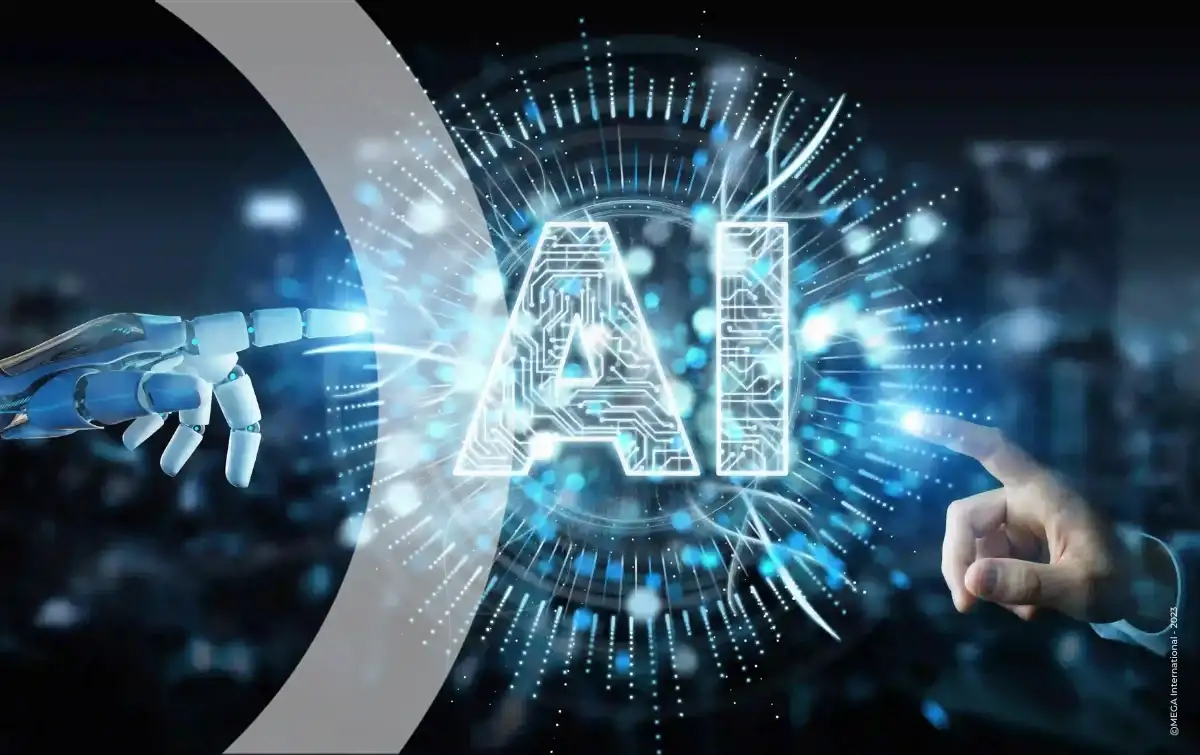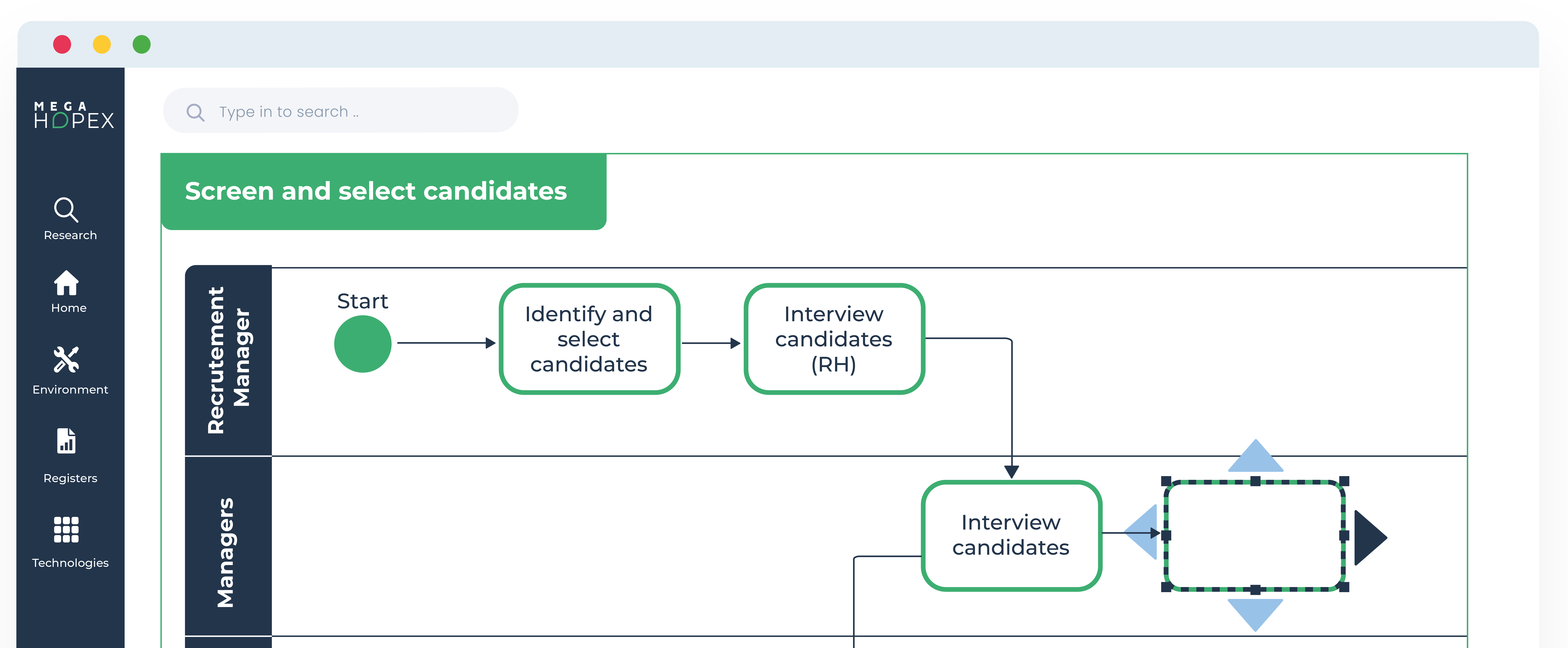
How Artificial Intelligence is Transforming the Business
AI is transforming how businesses operate and is already changing the landscape of numerous industries. Business leaders, get ready to see AI revolutionize the future of your industry!
Artificial Intelligence (AI) has emerged as a revolutionary force in the business world, reshaping traditional practices and propelling organizations into the future. The integration of AI technologies has the potential to transform business operations and drive innovation across various industries.
How does AI revolutionize the future of business?
Artificial intelligence is changing the way businesses operate, transforming traditional methods with AI and machine learning. By leveraging the power of AI, businesses can analyze data, identify patterns, and provide insightful recommendations to augment humans and make better decisions.
AI algorithms can also process large amounts of data much faster than humans, saving time and resources. This helps them make quicker and more accurate decisions that can lead to new business opportunities. Artificial intelligence is also changing how companies manage their supply chains, consumer behavior, and other business operations.
ChatGPT is an example of how AI can help businesses transform customer interactions. Using Generative AI technologies, AI chatbots can provide quick and accurate responses to customer queries, improving overall customer satisfaction. This is just one area where AI is revolutionizing the business world, and countless other aspects of the business can benefit from AI integration.
Let's explore how AI helps businesses stay ahead of the curve:
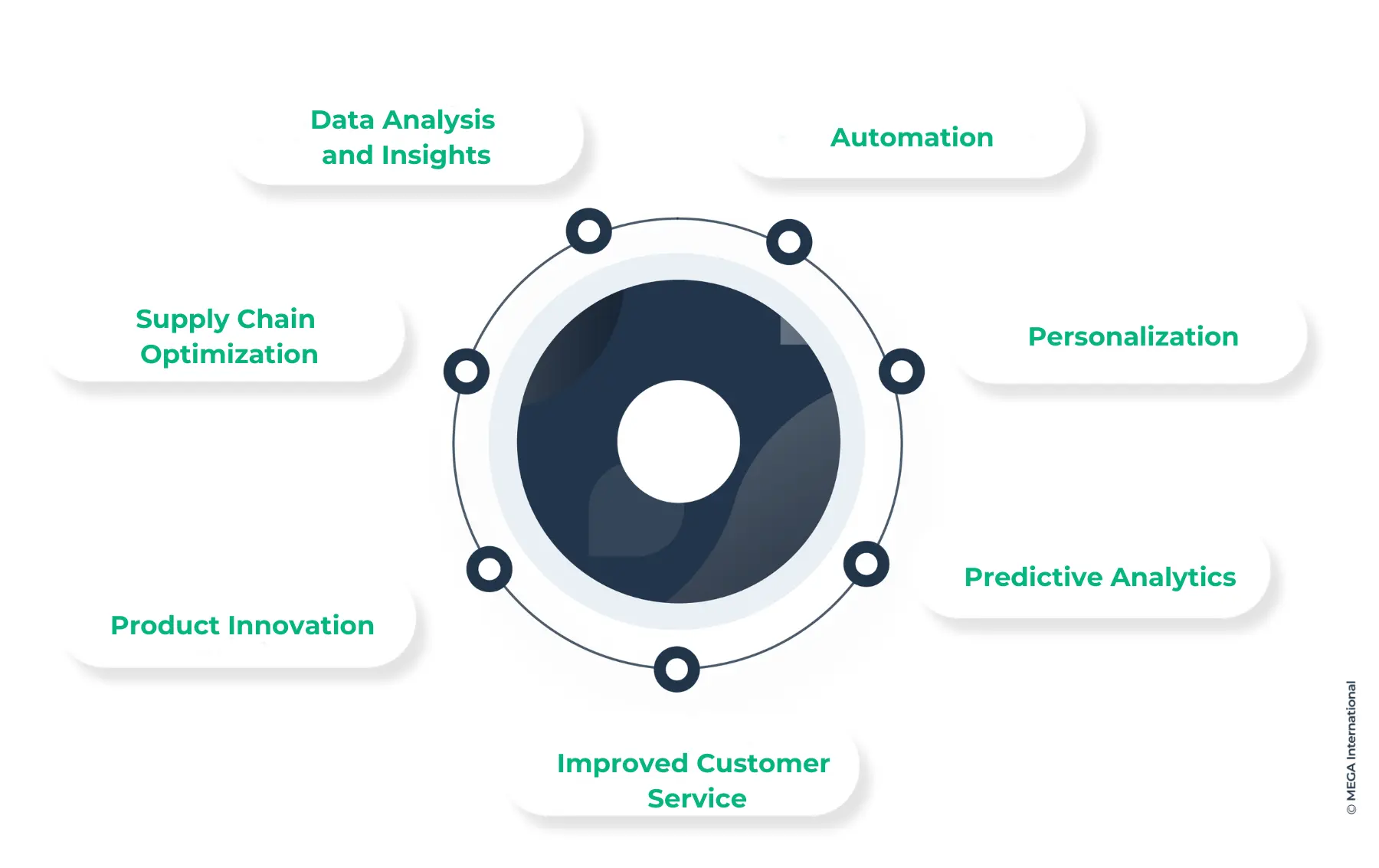
- Data Analysis and Insights: AI enables businesses to process large volumes of data quickly and accurately, extracting valuable insights to inform strategic decisions. This data-driven approach helps companies better understand customer behavior, market trends, and operational efficiency.
- Automation: AI technologies such as machine learning and robotic process automation (RPA) automate repetitive tasks, increasing operational efficiency and reducing manual intervention. This frees employees to focus on more strategic and creative tasks, driving innovation within the organization.
- Personalization: AI-powered algorithms analyze customer data to personalize products, services, and marketing efforts. By delivering tailored experiences to individual customers, businesses can enhance customer satisfaction, loyalty, and revenue.
- Predictive Analytics: AI enables businesses to forecast future trends and outcomes based on historical data, helping them anticipate market shifts, identify potential risks, and seize new opportunities. Predictive analytics empower companies to make proactive decisions, mitigating risks and maximizing returns.
- Improved Customer Service: AI-driven chatbots and virtual assistants provide instant customer support, answering queries, resolving issues, and even completing transactions autonomously. This 24/7 availability enhances customer satisfaction and reduces operational costs for businesses.
- Product Innovation: AI facilitates the development of innovative products and services by analyzing market trends, identifying unmet needs, and generating new ideas. Businesses can leverage AI to streamline the product development process, accelerate time-to-market, and gain a competitive edge.
- Supply Chain Optimization: AI optimizes supply chain operations by predicting demand, optimizing inventory levels, and improving logistics and transportation efficiency. By enhancing visibility and agility within the supply chain, businesses can reduce costs, minimize disruptions, and improve customer service.
Benefits of integrating AI into business processes
Businesses today are beginning to see the potential of AI and how its integration into business processes can greatly impact their operations. From supply chain management to business decision-making, AI algorithms can analyze vast amounts of data in real-time and provide valuable insights that drive growth and efficiency.
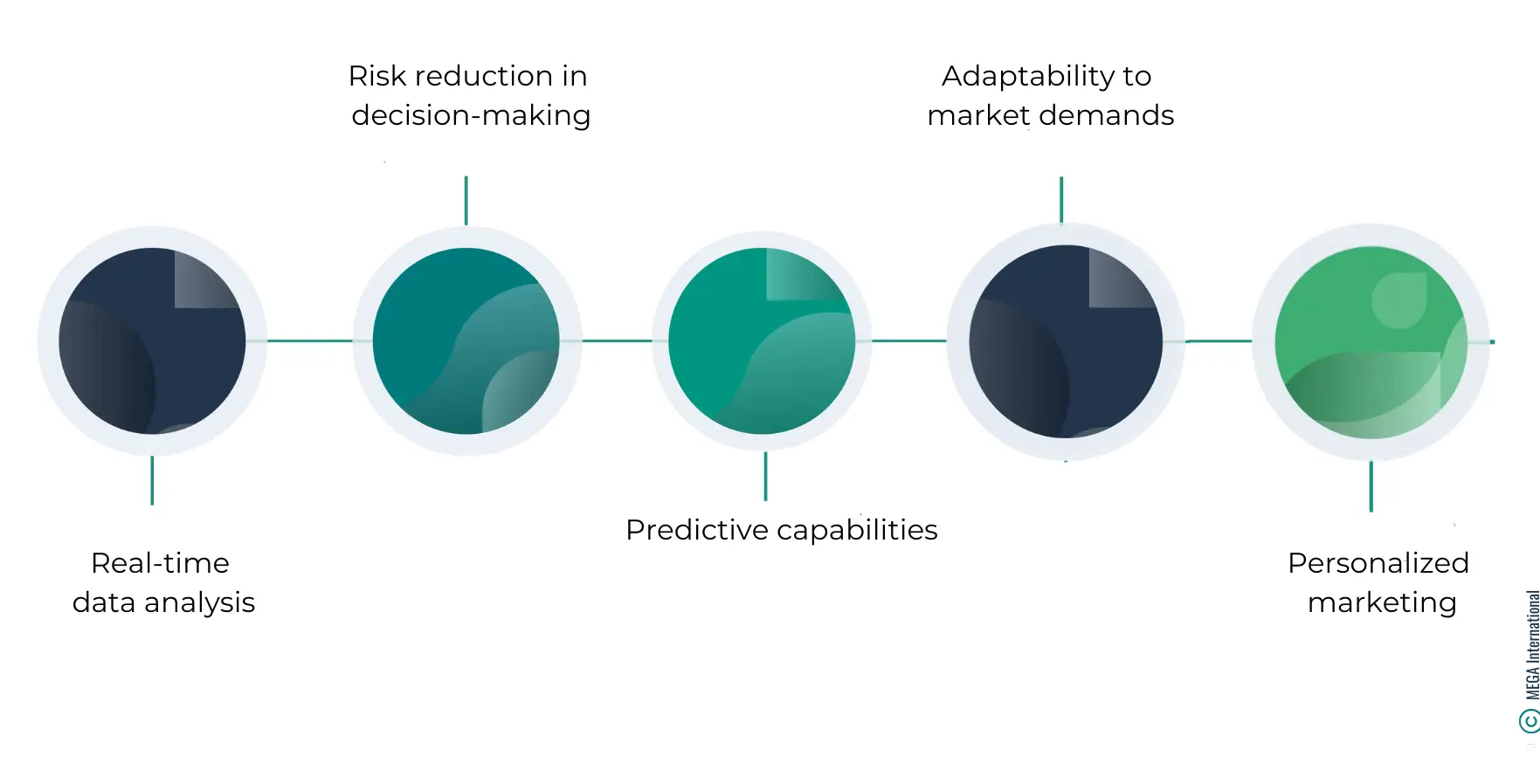
AI in various applications, such as AI and automation, revolutionizes how we work and interact with technology. One key benefit of developing a robust AI strategy is reducing the risk associated with decision-making.
AI also enhances businesses' capabilities to predict consumer behavior and optimize marketing strategies. By using AI to analyze customer data and trends, businesses can create targeted marketing campaigns more likely to resonate with their target audience.
AI systems can analyze customer feedback and sentiment in real-time, allowing businesses to adapt and respond quickly to changing market demands. This ability to personalize and tailor marketing efforts is invaluable in today's competitive business environment.
As AI becomes more advanced and new AI applications are being developed, the possibilities for its impact on businesses are limitless.
Many businesses today are already using AI to automate routine tasks, freeing up employees to focus on more strategic and creative endeavors. As businesses continue to believe AI will revolutionize their operations, integrating AI into business processes will only continue to grow.
How can businesses effectively embrace AI technology?
Businesses can effectively embrace AI technology by developing a comprehensive AI strategy, investing in AI talent and resources, and measuring AI initiatives' return on investment (ROI). Training employees to adapt to AI-powered systems is crucial for successfully integrating and adopting AI technologies.
The importance of AI strategy and implementation planning
AI strategy and implementation planning are crucial components of a successful modern business. AI is transforming business operations in ways we never thought possible.
Empowering employees with the necessary skills and knowledge to work effectively with AI-powered systems is essential for driving organizational transformation. Providing targeted training programs and fostering a culture of continuous learning can help employees adapt to the changing business landscape and leverage AI tools effectively.
AI frees employees from mundane tasks, allowing them to focus on more strategic and creative initiatives. By automating routine processes, employees can devote their time and energy to higher-value activities that drive innovation and growth. This not only boosts employee morale but also enhances overall productivity.
Challenges faced when implementing AI in business
The AI revolution has brought about significant technological advancements that have the potential to reduce risk and increase organizational productivity. As AI applications become more widespread, companies can harness the power of AI models to drive innovation, promote growth, and gain competitive advantages in the market. It is clear that AI is already positively impacting businesses across various industries.
While the benefits of AI are substantial, businesses also face challenges when implementing AI systems.
These challenges include:
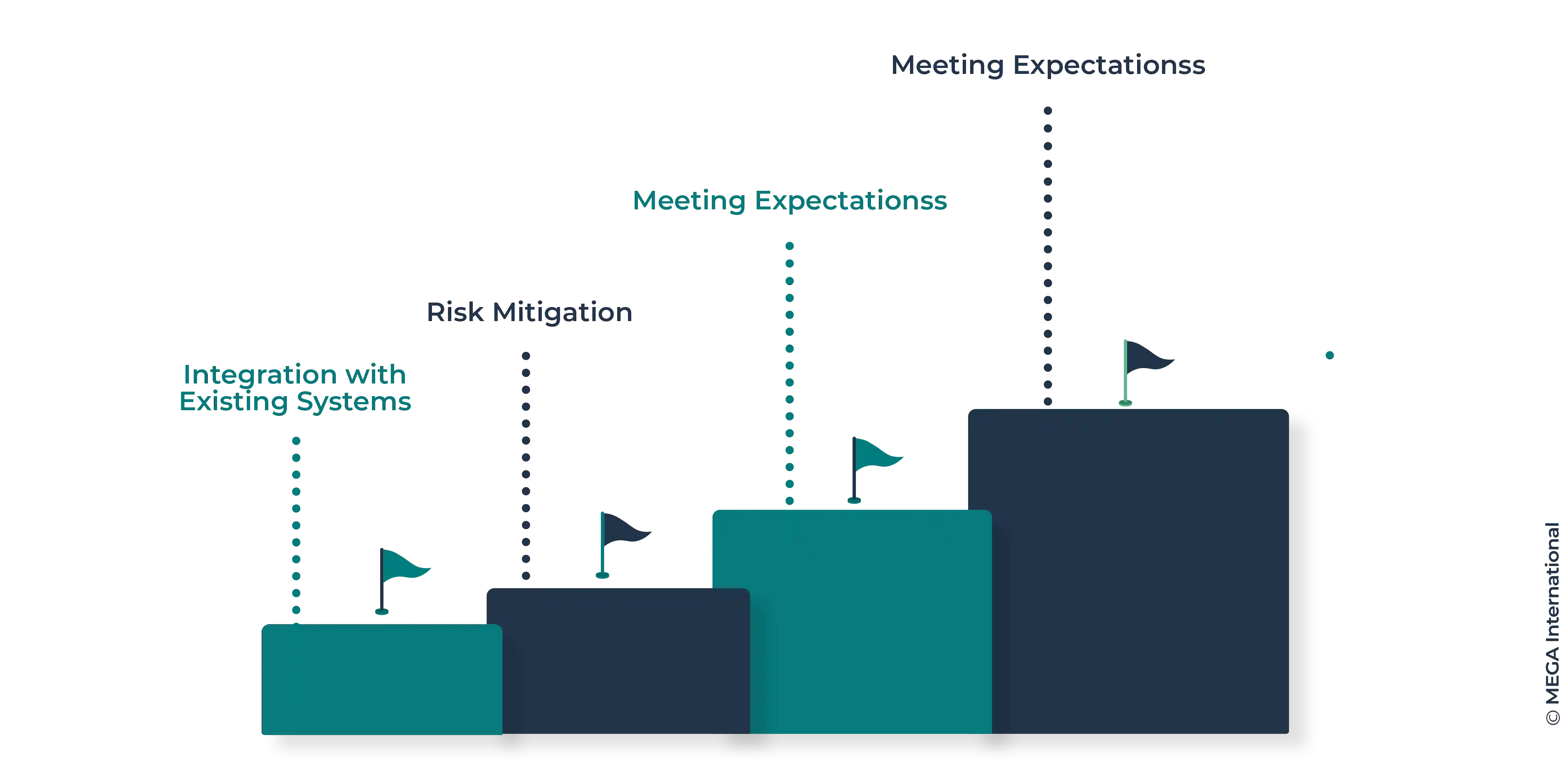
- Integration with Existing Systems: Ensuring seamless integration with current systems and processes is a key challenge in AI implementation, requiring meticulous planning.
- Risk Mitigation: Companies must address potential risks associated with AI implementation and take necessary precautions to minimize these risks.
- Meeting Expectations: AI models sometimes fail to meet organizational expectations or requirements, necessitating a thorough evaluation of needs before deployment.
- Data Quality and Bias: Issues like data quality and AI bias can impact the accuracy and reliability of AI algorithms, posing additional challenges during implementation.
Future trends of AI in business
AI will continue to reshape the business landscape, driving innovation and transformation across industries. As AI technologies become more accessible, businesses will increasingly integrate AI into their operations to gain a competitive edge.
From automating routine tasks to enhancing decision-making and customer experiences, AI will drive efficiency, productivity, and growth in the digital age.
Organizations that successfully harness the power of AI will be better positioned to adapt to market changes, capitalize on emerging opportunities, and thrive in an increasingly interconnected and data-driven world.
Summary
With AI leading the way, you can expect increased productivity, improved decision-making, and enhanced customer satisfaction. Business leaders who embrace the AI revolution and invest in building AI literacy within their organizations will be well-positioned to navigate the challenges of the digital age. So, don't wait any longer - seize this opportunity to transform your business and shape the future of your industry.
Related Content to Business Process Management
Get a clear understanding of how your operation runs, identify areas of improvement, and build scenarios to optimize and transform business processes;
MEGA HOPEX for BPM
Request a demonstration of HOPEX for BPM, and see how you can have immediate value of your projects.



